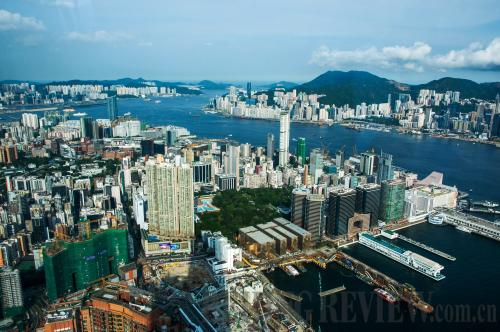|
 |
|
EASTERN PEARL: A panoramic view of Hong Kong's Kowloon Peninsula and Hong Kong Island in May (CFP) |
Hong Kong's democracy is about to make another leap forward after the National People's Congress (NPC) Standing Committee decided to grant universal suffrage in the selection of Hong Kong's chief executive on the basis of nomination by a "broadly representative" committee.
The decision on how the chief executive of the Hong Kong Special Administrative Region (HKSAR) will be selected was passed unanimously at the bi-monthly session of the standing committee of China's top legislature on August 31.
The decision allows two or three candidates to run for the HKSAR's top job after obtaining support from at least half of a nominating committee that "shall be chosen in accordance with the number of members, composition and formation method of the election committee for the fourth chief executive."
According to the NPC decision, all eligible voters in the region will be able to have their say in who the chief executive for the HKSAR will be, while the existing system and voting procedures for the Legislative Council will remain unchanged. Under Hong Kong's Basic Law, it is stipulated that "all permanent residents of the HKSAR shall have the right to vote and the right to stand for election in accordance with law."
Li Fei, Vice Secretary General of the NPC Standing Committee, said during a press conference on August 31 afternoon that the size of the nominating committee was set at 1,200.
The chief executive-elect, after being selected through voting by the populace, will still need to be appointed by the Central Government, according to the decision, which stressed that the chief executive has to be a person who "loves the country and loves Hong Kong."
Li said this is a basic requirement for the "one country, two systems" policy. The method for selecting the chief executive by universal suffrage must provide corresponding institutional safeguards for this purpose.
Top Chinese legislator Zhang Dejiang also said on August 31 that the new decision was of great importance to implementing the principles of "one country, two systems" and ensuring that the region maintains a high degree of autonomy while following the Hong Kong Basic Law.
"The decision is vital for steadily developing democracy in Hong Kong and implementing the selection of the HKSAR chief executive by universal suffrage according to law," he said.
Britain made no mention of democracy for Hong Kong until the dying days of nearly 150 years of colonial rule. Before Hong Kong was returned to China on July 1, 1997, the Governors of Hong Kong were all appointed by the British Crown, without recourse to any pretense of democracy.
| 